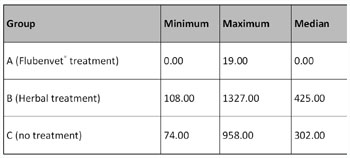Natural Parasite Control Called Into Question
 14 years ago
14 years ago  4127 views
4127 views
Posted
2nd August, 2010 14h10
 Table 1: Worm Count Summaries
Discussion
The results showed that very few worm eggs were present after one 7-day treatment with Flubenvet®. In contrast, those that had no treatment or the herbal treatment still had hundreds of worm eggs in their droppings, suggesting that there were still many adult egg-laying worms present inside the chickens.
Poultry keepers who rely on preparations like this particular natural wormer may well be building up problems, as the additional numbers of worm eggs in the environment add to the infection pressure and can result in greater worm burdens for their birds. Birds with high worm burdens are more likely to become ill.
H. gallinarum – causes mild illness but also acts as a carrier for the microscopic protozoan parasite Histomonas meleagridis (Blackhead) in turkeys. The eggs of the worm can live for years in soil so this parasite can be difficult to eradicate and re-infection is common unless regular and effective worming is carried out.
Capillaria – causes malnutrition, emaciation and anaemia in chickens and death in other poultry species.
Ascaridia gali – causes emaciation, drop in egg production, ill thrift, anaemia, intestinal blockage and death. Occasionally the parasitic worms may be found in chicken eggs. Earthworms are a common intermediate host, particularly likely to result in parasitic infection of free-range poultry when they eat earthworms.
According to the Veterinary Medicines Regulations 2009 any product making veterinary medicinal claims needs to be licensed by the Veterinary Medicines Directorate. A licensed product has to show proven efficacy and safety for the animal species involved. Licensed veterinary medicines can be identified by their Vm number, which is shown on-pack. Products termed ‘nutritional supplements’, that are not licensed do not require the manufacturer to produce any proof of efficacy or safety. It is often easy to buy such products ‘off the shelf’ because they are not subject to any controls. Any poultry keeper who cares about the health and welfare of the birds is advised to think carefully about their choice of wormer and to seek advice from a vet pharmacist or Suitably Qualified Person (SQP).
Flubenvet™ 1 % Medicated Premixture is prepared from Flubenvet™ 5% w/w Premix for Medicated Feedingstuff which contains flubendazole 5 % w/w, with Vm number 00242/4056 and legal category POM-VPS.
For full details on the use of these products please refer to the insert or SPC.
Advice on the use of these, or alternative medicines should be sought from the medicine prescriber.
Further information is available from Janssen Animal Health, 50-100 Holmers Farm Way, High Wycombe, Bucks, HP12 4EG Tel 01494 567555 Fax 01494 567556 Email: [email protected]
Table 1: Worm Count Summaries
Discussion
The results showed that very few worm eggs were present after one 7-day treatment with Flubenvet®. In contrast, those that had no treatment or the herbal treatment still had hundreds of worm eggs in their droppings, suggesting that there were still many adult egg-laying worms present inside the chickens.
Poultry keepers who rely on preparations like this particular natural wormer may well be building up problems, as the additional numbers of worm eggs in the environment add to the infection pressure and can result in greater worm burdens for their birds. Birds with high worm burdens are more likely to become ill.
H. gallinarum – causes mild illness but also acts as a carrier for the microscopic protozoan parasite Histomonas meleagridis (Blackhead) in turkeys. The eggs of the worm can live for years in soil so this parasite can be difficult to eradicate and re-infection is common unless regular and effective worming is carried out.
Capillaria – causes malnutrition, emaciation and anaemia in chickens and death in other poultry species.
Ascaridia gali – causes emaciation, drop in egg production, ill thrift, anaemia, intestinal blockage and death. Occasionally the parasitic worms may be found in chicken eggs. Earthworms are a common intermediate host, particularly likely to result in parasitic infection of free-range poultry when they eat earthworms.
According to the Veterinary Medicines Regulations 2009 any product making veterinary medicinal claims needs to be licensed by the Veterinary Medicines Directorate. A licensed product has to show proven efficacy and safety for the animal species involved. Licensed veterinary medicines can be identified by their Vm number, which is shown on-pack. Products termed ‘nutritional supplements’, that are not licensed do not require the manufacturer to produce any proof of efficacy or safety. It is often easy to buy such products ‘off the shelf’ because they are not subject to any controls. Any poultry keeper who cares about the health and welfare of the birds is advised to think carefully about their choice of wormer and to seek advice from a vet pharmacist or Suitably Qualified Person (SQP).
Flubenvet™ 1 % Medicated Premixture is prepared from Flubenvet™ 5% w/w Premix for Medicated Feedingstuff which contains flubendazole 5 % w/w, with Vm number 00242/4056 and legal category POM-VPS.
For full details on the use of these products please refer to the insert or SPC.
Advice on the use of these, or alternative medicines should be sought from the medicine prescriber.
Further information is available from Janssen Animal Health, 50-100 Holmers Farm Way, High Wycombe, Bucks, HP12 4EG Tel 01494 567555 Fax 01494 567556 Email: [email protected]More from
- IVC Evidensia assembles expert team to run new £10m referral hospital
- Home delivery service can increase pet health plan sign-ups by 25%
- Research reveals vital clues to help fight anthelmintic resistance
- Lifetime Achievement Award recognises Harrogate vet’s dedication to improving the health and welfare of rabbits
- Bake sale at Leicestershire vet practice for good cause

